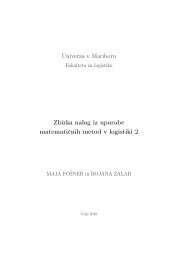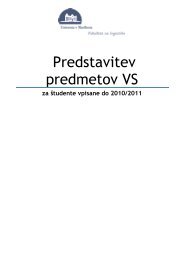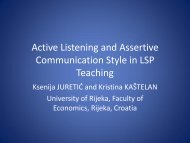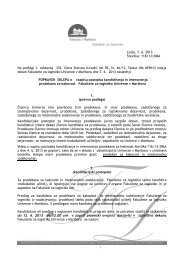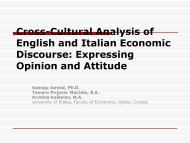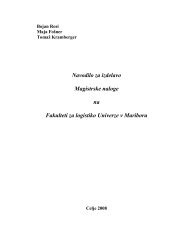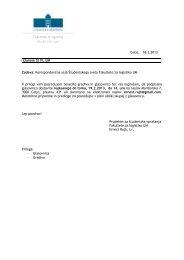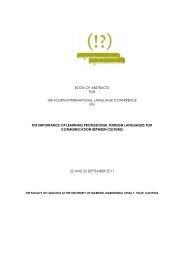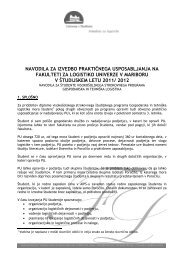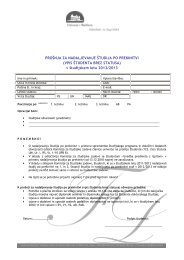Funny Errors in the Inter-language of Law Students
Funny Errors in the Inter-language of Law Students
Funny Errors in the Inter-language of Law Students
- No tags were found...
Create successful ePaper yourself
Turn your PDF publications into a flip-book with our unique Google optimized e-Paper software.
<strong>Funny</strong> <strong>Errors</strong> <strong>in</strong> <strong>the</strong> <strong>Inter</strong><strong>language</strong><strong>of</strong> <strong>Law</strong> <strong>Students</strong>Ljubica Kordić and Dubravka PapaFaculty <strong>of</strong> <strong>Law</strong>, Osijek University, Croatia
Structure <strong>of</strong> <strong>the</strong> presentation:I. Introduction:Features <strong>of</strong> students’ <strong>in</strong>ter-<strong>language</strong>Classification <strong>of</strong> errors;II. Research:Goals, corpus, methodologyL<strong>in</strong>guistic analysis <strong>of</strong> <strong>the</strong> samplea) Phonetic & phonological levelb) Morpho-syntactic levelc) Semantic leveld) Grammatical levele) The level <strong>of</strong> phraseologyIII. Discussion <strong>of</strong> <strong>the</strong> Results and Conclusion
I. INTRODUCTION1. Features <strong>of</strong> students’ <strong>in</strong>ter<strong>language</strong>:<strong>Inter</strong>-<strong>language</strong> denotes a <strong>language</strong> systemstudents design <strong>in</strong> <strong>the</strong> L2 learn<strong>in</strong>g period whichdiffers from L1 and L2 (Sel<strong>in</strong>ker)Ma<strong>in</strong> features <strong>of</strong> that system:a) <strong>the</strong> creation <strong>of</strong> abstract <strong>language</strong> rules,b) <strong>the</strong> subjection to external and <strong>in</strong>ternal impact,c) changeable grammar rules andd) errors as a result <strong>of</strong> diverse learn<strong>in</strong>g strategies.
2. Classification <strong>of</strong> <strong>Errors</strong>Many classifications refer to errors occurr<strong>in</strong>g <strong>in</strong> <strong>the</strong>production <strong>of</strong> L2, like Corder’s classification (omission <strong>of</strong><strong>the</strong> required elements, addition <strong>of</strong> unnecessary or<strong>in</strong>accurate elements, selection <strong>of</strong> <strong>in</strong>accurate elementsand <strong>in</strong>adequate order<strong>in</strong>g)As we analyze errors <strong>in</strong> understand<strong>in</strong>g FL andtranslation from FL as a (re)productive <strong>language</strong> activity,<strong>the</strong> most relevant classification for our research is <strong>the</strong>one <strong>of</strong>fered by Richards:1) Intral<strong>in</strong>gual errors - caused by <strong>in</strong>sufficient target<strong>language</strong> knowledge (reflected <strong>in</strong> faulty generalizationsand <strong>in</strong>complete rule application)2) Develop<strong>in</strong>g errors - caused by student’s creat<strong>in</strong>ghypo<strong>the</strong>sis on <strong>the</strong> function<strong>in</strong>g <strong>of</strong> FL system accord<strong>in</strong>g tohis limited experience.3) <strong>Inter</strong>l<strong>in</strong>gual errors (Ellis, 1985) - caused by <strong>the</strong> mo<strong>the</strong>rtongue <strong>in</strong>terference.
II. RESEARCHA. Goal, Corpus and MethodologyThe ma<strong>in</strong> goal <strong>of</strong> this paper: to analyze students’ errors<strong>in</strong> <strong>the</strong> understand<strong>in</strong>g and translation <strong>of</strong> orig<strong>in</strong>al legaltexts, <strong>in</strong> order to establish <strong>the</strong> most common errors andto discover most strik<strong>in</strong>g problems <strong>in</strong> understand<strong>in</strong>g legaltexts <strong>in</strong> English as a foreign <strong>language</strong>.Special emphasis will be put on <strong>the</strong> errors compris<strong>in</strong>g<strong>the</strong> elements <strong>of</strong> humour. Such elements mostly arisefrom <strong>the</strong> <strong>language</strong> transfer, i.e. from <strong>the</strong> <strong>in</strong>terference <strong>of</strong><strong>the</strong> mo<strong>the</strong>r tongue, as well as from <strong>the</strong> low level <strong>of</strong>students’ knowledge
Corpus <strong>of</strong> <strong>the</strong> research: One hundred examswritten by <strong>the</strong> second year students <strong>of</strong> <strong>the</strong>Faculty <strong>of</strong> <strong>Law</strong> <strong>in</strong> Osijek, Croatia.The research is focused on <strong>the</strong> first part <strong>of</strong> <strong>the</strong>exams, consist<strong>in</strong>g <strong>of</strong> <strong>the</strong> orig<strong>in</strong>al English textsfrom <strong>the</strong> field <strong>of</strong> law, which our studentstranslated <strong>in</strong>to Croatian.Four different texts are <strong>in</strong>cluded <strong>in</strong>to <strong>the</strong>research, encompass<strong>in</strong>g 120 – 200 words each.The texts are different <strong>the</strong>matically and refer topublic law, crim<strong>in</strong>al law, <strong>the</strong> role <strong>of</strong> <strong>the</strong> police <strong>in</strong><strong>the</strong> British legal system and <strong>the</strong> division <strong>of</strong>Judiciary <strong>in</strong> Great Brita<strong>in</strong>.
The methodology used <strong>in</strong> <strong>the</strong> research:1) read<strong>in</strong>g students’ translations,2) excerption and classification <strong>of</strong> errors accord<strong>in</strong>gto 5 l<strong>in</strong>guistic levels:- <strong>the</strong> level <strong>of</strong> phonology & phonetics,- <strong>the</strong> morpho-syntactic level,- <strong>the</strong> semantic level,- <strong>the</strong> grammatical level and- <strong>the</strong> level <strong>of</strong> phraseology.
B. L<strong>in</strong>guistic Analysis <strong>of</strong> <strong>the</strong>SampleThe concept “funny errors”: Accord<strong>in</strong>g to Erdeljac andHorga, errors can be understood as failures <strong>in</strong> target<strong>in</strong>ga mental lexicon <strong>language</strong> unit by activat<strong>in</strong>g wrong units.When errors <strong>in</strong>clude <strong>the</strong> elements <strong>of</strong> contrast andunexpectedness <strong>the</strong>y are <strong>of</strong>ten humorous and causelaughter.Most common funny errors are known as false friends:They are usually homonyms or homophones, and <strong>the</strong>funny effect <strong>the</strong>y produce is caused by <strong>the</strong> contrastbetween <strong>the</strong> form (sound) and <strong>the</strong> content we attach tothat form <strong>in</strong> our mo<strong>the</strong>r tongue.
a) Phonetic & phonological level:Omission <strong>of</strong> English phonemes:rent<strong>in</strong>g ships was translated as iznajmljivanje ovaca(rent<strong>in</strong>g sheep); British policy, <strong>of</strong>ten mixed up with <strong>the</strong>word police.Transfer <strong>of</strong> some English phonemes and morphems,although <strong>the</strong>y do not belong to <strong>the</strong> Croatian <strong>language</strong>:kriv je za delikt trespasa…, Magistrats je odlučio…;konstabl može zaplijeniti…. An especially <strong>in</strong>terest<strong>in</strong>gcase was <strong>the</strong> translation <strong>of</strong> <strong>the</strong> sentence: It is not a gravecrime as To nije grave krim<strong>in</strong>al.False friends (because <strong>of</strong> <strong>the</strong>ir identical soundrealization <strong>in</strong> <strong>the</strong> two <strong>language</strong>s):<strong>the</strong> position is - pozicija je; <strong>the</strong> provision 58 - provizija 58;British policy - britanska policija.
Some o<strong>the</strong>r examples <strong>of</strong> falsefriends:Literal translation <strong>of</strong> <strong>the</strong> term crim<strong>in</strong>al courtas krim<strong>in</strong>alni sud led to a humorousdescription <strong>of</strong> <strong>the</strong> court as a crimecommitt<strong>in</strong>g<strong>in</strong>stitution; (correct: kaznenisud).Similarly, public protection is literallytranslated as javna protekcija, which turnsa semantically positive term <strong>in</strong>to a termreferr<strong>in</strong>g to someth<strong>in</strong>g legally wrong.
In <strong>the</strong> sentence: The policeman will be guilty <strong>of</strong> <strong>the</strong> tort <strong>of</strong>conversion, <strong>the</strong> word conversion was mixed up with aphonetically similar word conversation:In 3 cases we got translations like “policajac će biti krivza prekršaj govora (<strong>the</strong> policeman will be guilty <strong>of</strong> <strong>the</strong> tort<strong>of</strong> speech)” or a more imag<strong>in</strong>ative one: “... zazadržavanje na razgovoru” (... <strong>of</strong> <strong>the</strong> tort <strong>of</strong> detention for<strong>the</strong> purpose <strong>of</strong> conversation).Our favourite translation <strong>of</strong> this sentence <strong>in</strong>dicates that<strong>the</strong> student was th<strong>in</strong>k<strong>in</strong>g <strong>of</strong> an actual situation <strong>in</strong>Croatian society: “policajac je kriv za pretvorbu” - <strong>the</strong>policeman is guilty <strong>of</strong> <strong>the</strong> tort <strong>of</strong> transition to a marketeconomy.
O<strong>the</strong>r <strong>in</strong>terest<strong>in</strong>g examples showed how farstudents’ imag<strong>in</strong>ation can reach: <strong>in</strong>terest on loanmoney was translated as <strong>in</strong>teres za zajam novca,or even as: zanimanje za novac; women public(mean<strong>in</strong>g: women citizens) as ženska publika;Our favourite example: <strong>the</strong> word occupier (<strong>of</strong> <strong>the</strong>apartment) was translated (by 10 students!) asokupator (<strong>in</strong>vader).
) Morpho-syntactic level:<strong>Errors</strong> occurr<strong>in</strong>g at this level are mostlycaused by <strong>the</strong> mix<strong>in</strong>g-up <strong>of</strong> <strong>the</strong> parts <strong>of</strong>speech or <strong>the</strong>ir function <strong>in</strong> <strong>the</strong> sentence.(verbs are mixed-up with nouns or viceversa).Example: It was not allowed to forcejudge… is wrongly translated as: nedopušta se sila suca (Us<strong>in</strong>g force by <strong>the</strong>judge is not allowed).
The collocation Government supporters istranslated as vlada koja podržava (governmentwhich supports).An <strong>in</strong>terest<strong>in</strong>g case is when two verbs are falselytranslated as an adjective and a noun: thosewho might feel…is translated as: oni koji imajusnažan osjećaj (those who have a strongfeel<strong>in</strong>g).Our favourite example: <strong>the</strong> word Bill (declaration,convention) is understood as a personal name:The Government Bill is translated as Billovavlada (Bill’s Government).
<strong>Errors</strong> caused by students’ <strong>in</strong>sufficientknowledge <strong>of</strong> phrasal verbs:“<strong>the</strong> law ran out <strong>of</strong> time” was translated aszakon bježi od vremena (<strong>the</strong> law is runn<strong>in</strong>gaway from time);“to strike down <strong>the</strong> New Deal” wastranslated as: spustiti dolje program NewDeal, or as: srušiti dolje New Deal (to pulldown <strong>the</strong> New Deal), or even as a noun:štrajk New Deal programa (<strong>the</strong> strike <strong>of</strong><strong>the</strong> New Deal).
Examples <strong>of</strong> <strong>Students</strong>’ creativityIn <strong>the</strong> sentence: The number <strong>of</strong> rul<strong>in</strong>gshas cont<strong>in</strong>ued to drop, <strong>the</strong> last word istranslated as a noun kapljice (drops) byone student, and ano<strong>the</strong>r produced aromantic translation by us<strong>in</strong>g <strong>the</strong> wordsuze (tears): broj je padao poput suze (<strong>the</strong>number was fall<strong>in</strong>g like a tear).
c) Semantic levelEllis’s statement that <strong>the</strong> production <strong>of</strong> errors is affectedby <strong>the</strong> situational and l<strong>in</strong>guistic context is fullymanifested on <strong>the</strong> semantic level <strong>of</strong> analysis, becausepolysemic terms and phrases <strong>of</strong>ten occur <strong>in</strong> <strong>the</strong><strong>language</strong> <strong>of</strong> law: party, remedy or bar.Examples:A) legal term articles, which has different mean<strong>in</strong>gs <strong>in</strong>different contexts; In <strong>the</strong> sentence: “whe<strong>the</strong>r <strong>the</strong> policecan seize articles…,” it was translated by our students <strong>in</strong>many creative ways: as članak (article <strong>of</strong> <strong>the</strong> law),proizvod (product), or even odredba (provision), whichresulted <strong>in</strong> funny <strong>in</strong>formation that <strong>the</strong> policemen canseize a product, an article <strong>of</strong> law or a provision.
B) “He can use weapon to harm himself” was translated byone student as “on može uzeti oružje da primijeni zlo”(he can take weapon to apply evil), by ano<strong>the</strong>r as “možekoristiti oružje da nanese štetu” (he can use weapon to<strong>in</strong>flict damage).C) The term rul<strong>in</strong>g (judgement, judicial decision) wastranslated out <strong>of</strong> <strong>the</strong> given context as: vladanje,vladav<strong>in</strong>a, (reign), upravljanje (adm<strong>in</strong>istration), or zakon(law). Small number <strong>of</strong> students translated <strong>the</strong> termcorrectly, as presuda, odluka.D) Similarly, <strong>the</strong> term <strong>of</strong>fence was <strong>in</strong> most cases translatedas vrijeđanje (<strong>in</strong>sult) <strong>in</strong>stead <strong>of</strong> prekršaj (breach <strong>of</strong> law).
E) The sentence “If people are attached to <strong>the</strong> limitedpowers <strong>of</strong> <strong>the</strong> Constitution…” was translated as “ako suljudi pričvršćeni za ograničenu snagu ustava” (if peopleare fastened to <strong>the</strong> limited powers <strong>of</strong> <strong>the</strong> Constitution);F) Even typical legal terms to try and <strong>the</strong> court weretranslated as common <strong>language</strong> terms pokušati and dvor(2 students). So <strong>the</strong> statement “... <strong>the</strong> court is entitled totry <strong>the</strong> defendant summarily” was translated as “sudmože pokušati sažeti branjenika” (<strong>the</strong> court may try tosum up <strong>the</strong> defendant)Our favorite example:Enjoyment <strong>of</strong> one’s land was translated as naslade nečijezemlje (voluptuousness <strong>of</strong> / <strong>in</strong> one’s land).
d) Grammatical level:<strong>Errors</strong> <strong>of</strong> grammar nature are less <strong>in</strong>tenselyrepresented than errors on o<strong>the</strong>r levels <strong>of</strong>analysis;Most <strong>of</strong> <strong>the</strong>m relate to wrong translation <strong>of</strong>tenses and usually don’t have humorous effect;The lack <strong>of</strong> knowledge <strong>of</strong> passive voice (<strong>the</strong>passive subject was translated as active) cansometimes cause laughter, like <strong>in</strong> <strong>the</strong> sentence:“The occupier should be told by <strong>the</strong> policemanwhy he requires entry”, which was translated as“Vlasnik stana mora reći policajcu zašto želi ući”(= The occupier should tell <strong>the</strong> policemen whyhe requires entry).
e) The level <strong>of</strong> phraseologyThe lack <strong>of</strong> knowledge <strong>of</strong> legal phraseology was cause<strong>of</strong> most errors;Even some phrases from everyday speech weretranslated literally: broadly speak<strong>in</strong>g as široko govoreći,for example as za primjer and to make difference aspraviti razliku.Wrongly translated legal phrases:- public good as dobro publike (good <strong>of</strong> <strong>the</strong> public) <strong>in</strong>stead<strong>of</strong> opće dobro;- legal system as legalni sistem (<strong>in</strong>stead <strong>of</strong> pravni sustav),- lay people (non-pr<strong>of</strong>essionals) as podložni ljudi(subord<strong>in</strong>ated people) and- <strong>the</strong> challenged by-law (an opposed/ denied by-law) asizazvani zakon.
In <strong>the</strong> second case <strong>the</strong> translation gives quite anopposite impression: “Upotreba sile od strane policijetreba biti u granicama normale i primjenjivana dokle jepotrebno” (The use <strong>of</strong> force by <strong>the</strong> police should beapplied with<strong>in</strong> <strong>the</strong> limits <strong>of</strong> normality and as long as it isnecessary).Examples <strong>of</strong> students’ creativity <strong>in</strong>translation:“The use <strong>of</strong> force by <strong>the</strong> police must be reasonable anddelayed until it is necessary” was translated as:“Upotreba sile od strane policije trebala bi biti umjerena tj.odgovorna i moraju biti blagi osim ako je to u slučajunužde” (The use <strong>of</strong> force by <strong>the</strong> police should bemoderate i.e. responsible and <strong>the</strong>y have to be gentleexcept <strong>in</strong> <strong>the</strong> case <strong>of</strong> necessity).
Our favourite example:Legal phrase <strong>the</strong> weaker party (mean<strong>in</strong>g<strong>the</strong> party who is supposed to loose <strong>the</strong>case) was translated as vikend tulum(weekend party).- The explanation for this translation couldbe <strong>the</strong> transfer <strong>of</strong> <strong>the</strong> mo<strong>the</strong>r tongue, butalso <strong>the</strong> fact that <strong>the</strong> exam was written onMonday morn<strong>in</strong>g, probably after one <strong>of</strong> <strong>the</strong>weekend parties.
III. CONCLUSIONThree types <strong>of</strong> errors were analyzed:a) <strong>in</strong>tral<strong>in</strong>gual errors, caused by students’ <strong>in</strong>sufficientknowledge <strong>of</strong> English as a FL,b) develop<strong>in</strong>g errors, caused by students’ creat<strong>in</strong>ghypo<strong>the</strong>sis on function<strong>in</strong>g <strong>of</strong> FL system, which arecorrected as <strong>the</strong> knowledge <strong>of</strong> <strong>the</strong> <strong>language</strong> systemimproves, andc) <strong>in</strong>terl<strong>in</strong>gual errors, caused by <strong>the</strong> <strong>in</strong>terference <strong>of</strong> <strong>the</strong>mo<strong>the</strong>r tongue and <strong>the</strong> transfer <strong>of</strong> its structures <strong>in</strong>to <strong>the</strong>L2.As our research showed, students <strong>of</strong> <strong>the</strong> tertiaryeducation level mostly make errors <strong>of</strong> <strong>in</strong>terl<strong>in</strong>gual and<strong>in</strong>tral<strong>in</strong>gual character while translat<strong>in</strong>g legal texts fromEnglish <strong>in</strong>to Croatian. Develop<strong>in</strong>g errors occur on <strong>the</strong>morho-syntactic and <strong>the</strong> grammatical level.
Quantitative analysis <strong>of</strong> errors:<strong>Errors</strong> occur most frequently on semantic level(22) and <strong>the</strong> level <strong>of</strong> phonetics and phonology(20 errors).<strong>Errors</strong> on <strong>the</strong> level <strong>of</strong> phraseology arerepresented with 15 examples;<strong>Errors</strong> found on <strong>the</strong> level <strong>of</strong> morphology andsyntax are represented with 14 examples;Grammatical errors were not thoroughlyanalyzed <strong>in</strong> this paper, as its ma<strong>in</strong> goal was topresent and to analyze errors compris<strong>in</strong>g <strong>the</strong>elements <strong>of</strong> humour.
These results should be considered as<strong>in</strong>dicative for students’ <strong>in</strong>ter-<strong>language</strong> only <strong>in</strong><strong>the</strong> limited sense, because1) <strong>the</strong> research was focused only on <strong>the</strong> errorscompris<strong>in</strong>g <strong>the</strong> elements <strong>of</strong> humour,2) it was carried out on students’ translationsfrom English <strong>in</strong>to Croatian as a reproductive<strong>language</strong> activity.To get a more precise <strong>in</strong>sight <strong>in</strong>to <strong>the</strong>character <strong>of</strong> students’ <strong>in</strong>ter-<strong>language</strong>, a widerresearch <strong>of</strong> errors <strong>in</strong>clud<strong>in</strong>g all types <strong>of</strong><strong>language</strong> activity should be carried out.




